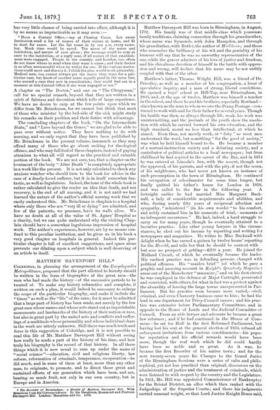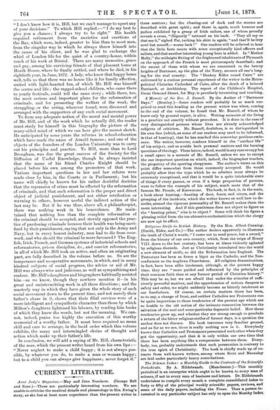MATTHEW DAVENPORT HILL*
COLERIDGE, in planning the arrangement of the Eacyclopcedia Metropolitana, proposed that the part allotted to history should be written in the form of biographies of the great men—the men who had made the history—of the successive periods to be treated of. To make any history exhaustive and complete, if written on such a plan, it would indeed be necessary to enlarge the scope of the particular biography, and make it include the -"times" as well as the "life" of the man; for it must be admitted that a large part of history has been made, not merely by the few great men whose names and whose acts stand out as imperishable monuments and landmarks of the history of their nation or race, but also in great part by the united acts and conflicts and suffer- ings of a multitude whose personality and whose individual share in the work are utterly unknown. Still there was much truth and force in this suggestion of Coleridge, and it is not possible to read this life of Mr. Matthew Davenport -Frill without seeing how really he made a part of the history of his time, and how truly his biography is the record of that history. In all those things which it is now usual to sum up under the name of "social science "—education, civil and religious liberty, law reform, reformation of criminals, temperance, co-operation—he did much, and in some of them at least, more than any other man, to originate, to promote, and to direct those great and sustained efforts of our generation which have been, and are, bearing so much fruit, not only in our own country, but in Europe and in America.
• The Reorder of Birmingham: a Memoir of Matthew Davenport Hill. With Selections from his Correspondence. By his Daughters, Rosamond and Florence Davenport Hill. London: Macmillan and Co. 1878.
Matthew Davenport Hill was born in Birmingham, in August, 1792. His family was of that middle-class which possesses family traditions, claiming connection through his grandmother, whose name was Symonds, with John Hampden, and through his grandfather, with Butler, the author of Hudibras ; and those who remember the brilliancy of his wit and the geniality of his humour will say that he was no unworthy representative of the one, while the graver admirers of his love of justice and freedom, and his chivalrous devotion of himself in the battle with oppres- sion and wrong, will declare that his name may be not unfitly coupled with that of the other.
Matthew's father, Thomas Wright Hill, was a friend of Dr. Priestley, as well as a member of his congregation, a lover of speculative inquiry, and a man of strong, liberal convictions. He opened a boys' school at Hill-Top, near Birmingham, in 1803, and, at the age of twelve, Matthew was himself a teacher in the school, and there he and his brothers, especially Rowland— since known as the man to whom we owe the Penny Postage—con- tinued to work with and for their father for several years. Though his health was then, as always through life, weak, his work was unintermitting, and the journals of the youth show the resolu- tion with which he carried forward his own education, and the high standard, moral no less than intellectual, at which he aimed. Even then, not merely work, or " duty " as most men understand the word, but something "for the good of society," was what he held himself bound to do. He became a member of a mutual-instruction society and a debating society, and a contributor of political articles to a local newspaper ; but from childhood he had aspired to the career of the Bar, and in 1814 he was entered at Lincoln's Inn, with the assent, though not the approval, of his parents, and with the pity, if not the scorn, of his neighbours, who had never yet known an instance of such presumption in the town of Birmingham. He continued his occupation of schoolmaster for some time longer, but finally quitted his father's house for London in 1818, and was called to the Bar in the following year. A fortnight earlier he had married Miss Margaret Buck- nail, a lady of considerable acquirements and abilities, and who, during nearly fifty years of reciprocal affection and sympathy, " ministered " (in his own words) "to his comfort, and nobly sustained him in his moments of trial,—moments of no infrequent occurrence." He had, indeed, a hard struggle to carry on for many years, though he eventually attained to a lucrative practice. Like other young lawyers in like circum- stances, he eked out his income by reporting and writing ft r newspapers and magazines. He writes to Miss Bucknall with delight when he has earned a guinea by twelve hours' reporting for the Herald, and tells her that he should be content with -- but sees no prospect of getting—E200 a year. He joined the Midland Circuit, of which he eventually became the leader. His earliest practice was in defending persons charged with political offences. His "maiden brief" (of which he gave a graphic and amusing account in Knight's Quarterly Magazine) arose out of the Manchester "massacre ;" and on his first circuit he was employed in the defence of Major Cartright, prosecuted and convicted, with others, for what in fact was a protest against the absurdity of leaving the large towns unrepresented in Par- liament. But his practice soon became more varied,—civil, criminal, and even Chancery business came to him ; he had the lead in one department for Privy-Council causes ; and his prac- tice was extensive before Parliamentary Committees, and in appeals to the House of Lords and the Judicial Committee of Council. From an able lawyer and advocate he became a great law reformer ; and if he had continued in the Douse of Com- mons—he sat for Hull in the first Reformed Parliament, but having lost his seat at the general election of 1834, refused all subsequent invitations from various constituencies—his popu- lar reputation and his official rewards would have been more, though the real work which he did could hardly
have been so noble and so great. As it was, he became the first Recorder of his native town ; and for the next twenty-seven years his Charges to the Grand Juries of the Birmingham Sessions were a series of calm and philo- sophical, yet not less practical than original, discourses on the administration of justice and the treatment of criminals, which were listened to with respect by the country and the Legislature. In 1851, Mr. Hill was appointed Commissioner of Bankruptcy for the Bristol District, an office which then ranked with the Judgeships of the Superior Courts ; and there his judgments carried unusual weight, so that Lord Justice Knight Bruce said,
" I don't know how it is, Hill, but we can't manage to upset any of your decisions." To which Hill replied :—" I do my best to give you a chance ; I always try to be right." His health required retirement from the anxieties and exertions of the Bar, which were, indeed, greater to him than to most men, from the singular way in which he always threw himself into the cause of his client, and he was glad to exchange the whirl of London life for the quiet of a country-house, within reach of his work at Bristol. There are many memories, grave and gay, among his surviving friends of that pleasant home at Heath House, where he finally settled, and where he died, in his eightieth year, in June, 1872. A lady, who knew that happy home well, tells us that there was no house like it for family affection, united with light-hearted fun, of which Mr. Hill was himself the centre and life ; the ragged-school children, who came there to yearly festivals, could tell the same story ; while there, too, the most serious and important plans for the reformation of criminals, and for promoting the welfare of the weak, the struggling, or the erring, wherever found, were discussed and arranged with the supporters of any such social movement.
To form any adequate notion of the moral and mental power of Mr. Hill, and of the work which he actually did, the reader must study for himself in this biography the picture of the many-sided mind of which we can here give the merest sketch. He anticipated by some years the reforms in school-education which have made the name of Arnold famous ; and one of the objects of the founders of the London University was to carry out his principles and practice. To Hill, more than to Lord Brougham, was due the great success of the Society for the Diffusion of Useful Knowledge, though he always insisted that the name of his friend Charles Knight should be placed before his own among the promoters of that work. Various important questions in law and law reform were made clear by him, in the Courts or in Parliament ; but his name will chiefly be known for his rather doubtful doctrine that the repression of crime must be effected by the reformation of criminals, and that such reformation is the proper and direct object of judicial punishment, and not either retribution or warning to others, however useful the indirect action of the last may be. But if he was thus, above all, a philanthropist, there was nothing weak in his benevolence. He main- tained that nothing less than the complete reformation of the criminal should be accepted, and sternly opposed the prac- tice of pardoning criminals because their health was being sacri- ficed by their punishment, saying that not only in the Army and Navy, but in every honest industry, men had to die from over- work, and why should the criminal be more favoured ? The Eng- lish, Irish, French, and German systems of industrial schools and reformatories, prison discipline, &c., and convict reformatories, in all of which Mr. Hill took an active, and often an originating part, are fully described in the volume before us. So are the temperance and co-operative movements, in which, and in many kindred subjects of social progress, the advice or aid of Mr. Hill was always wise and judicious, as well as sympathising and zealous. Mr. Hill's daughters and biographers habitually assisted him —as we know, though they nowhere mention it—in his great and unintermitting work in all these directions ; and the masterly way in which they have given the whole story of each social movement down to the present time, andnot merely their father's share in it, shows that their filial services were of a more intelligent and sympathetic character than those by which Milton's daughters lightened his labours, by reading him books of which they knew the words, but not the meaning. We can- not, indeed, praise too highly the execution of this worthy memorial of a worthy father. It must have required no mean skill and care to arrange, in the lucid order which this volume exhibits, the many and intermingled skeins of thought and action which make up their father' a life.
In conclusion, we will add a saying of Mr. Hill, characteristic of the man, which the present writer heard from his own lips :— "Never neglect to make a child happy ; it is not always pos- sible, by whatever you do, to make a man or woman happy ; but to a child you can always give happiness ; never forget it."



































 Previous page
Previous page